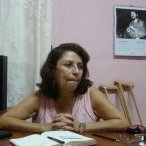English · Español

29 December 2011 | Interviews | Resisting neoliberalism | Food Sovereignty
Educate for Change
Interview with Julia Margarita Trujillo, Director of the Central American Peasant School
Download: MP3 (1.5 Mb)
Located in a field that belonged to a general of Anastasio Somoza’s dictatorship, close to Managua, Nicaragua, the Workers Peasant School Francisco Morazan, of the Rural Workers Association (ATC-Via Campesina) is a product of the agrarian reform of the Sandinista Revolution.
The director, Julia Margarita Trujillo, talked to Real World Radio and Brasil de Fato about the importance of political capacity building in the Latin American peasant movement and made reference to the changes that occurred in Nicaragua after the Revolution and the current Sandinista government led by Daniel Ortega in alliance with liberal sectors and sectors of the Catholic Church.
The 1st School of Communicators of CLOC-Via Campesina was held at the Peasant School last November. Several workshops on gender, agroecology and youth also took place with representatives from all Central America.
“We need political-ideological training but with a technical-productive perspective. We can’t speak of a system change on an empty stomach. We appeal to the historical memory: that the young people know that what they have now, even if it’s not much, has cost hundreds of lives”, said the Guatemalan leader who arrived to Nicaragua to fight together with the Sandinista movement after a period in Cuba, where her daughter Mariana was born, who is now a collaborator at the School.
The name of the school, Francisco Morazan, pays homage to one of the Central American leaders who was part of the generation of Augusto Cesar Sandino, Farabundo Martí and others, with a liberal and agrarian way of thinking, who thought of a region without internal divisions, led from current Guatemala.
But this project was destroyed by the intervention of the United States, who was concerned about this unification of the space traditionally thought of as their “backyard”.
However, the Peasant School is trying to preserve the legacy of Morazan for the new generations of peasant leaders of the region, who permanently come to training courses at the School located 13 km away from the capital city, Managua.
“I joined this political commitment when I was 19 years old, I’ve been doing this almost my whole life. In that moment, the path we had available was the armed struggle, claiming land in countries like ours that were essentially agrarian and where land was concentrated in the hands of a few…This hasn’t changed much, they are still the same families, although now many lands are in the hands of narcos”, said Julia Margarita in the interview where she discussed about the current situation of the countryside, of agricultural workers, and the possibilities of change in Central America.
“We are inside capitalism, however, we are still the enemies of the gringo empire”, Julia Margarita said, and she added: “the depth of the changes that take place or might take place in Nicaragua and any other country have to do with the level of awareness of the people, that’s why we aim to educate and draft proposals, policies”, said Julia Margarita.
Photo: Yannet Villegas







